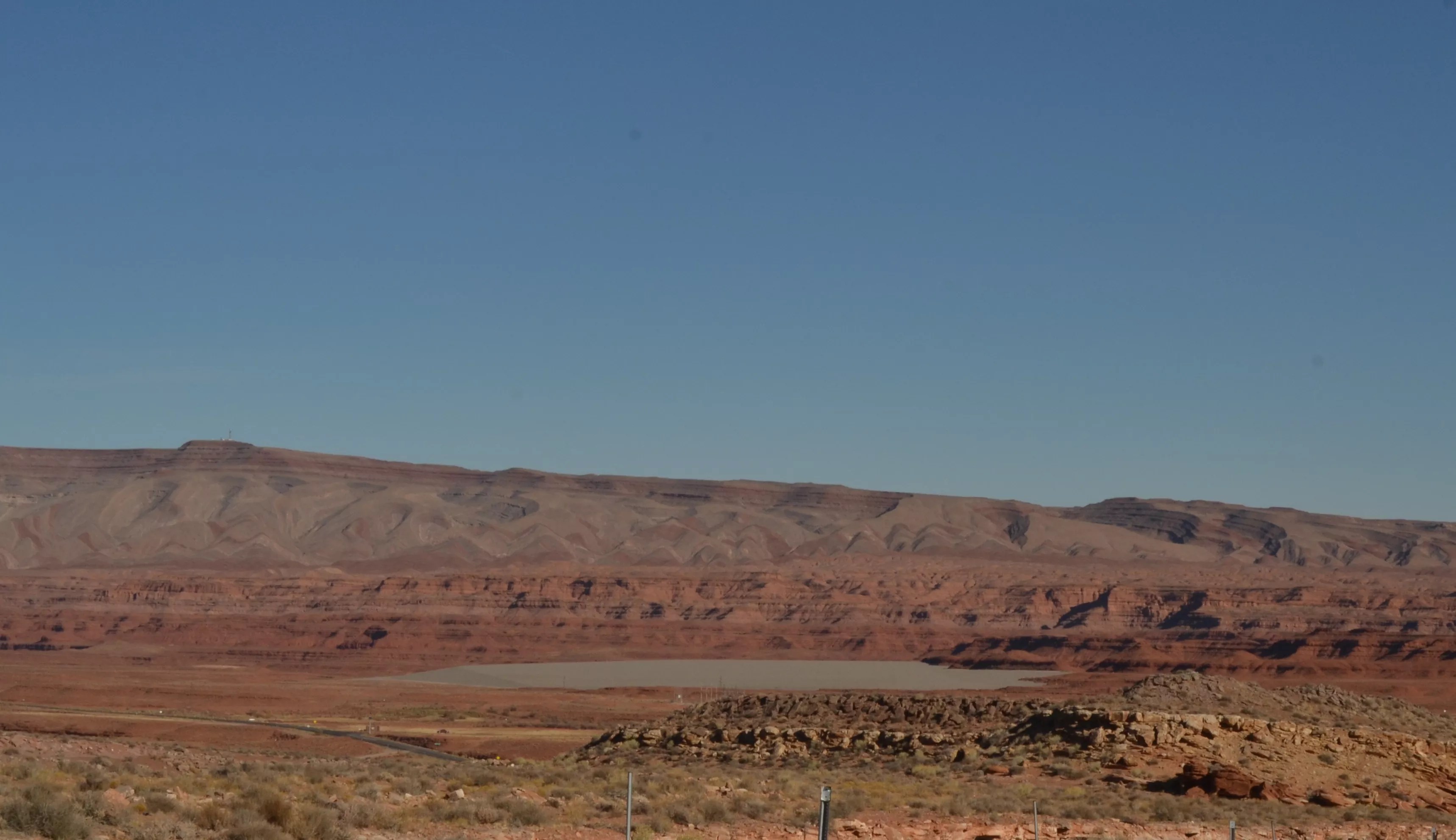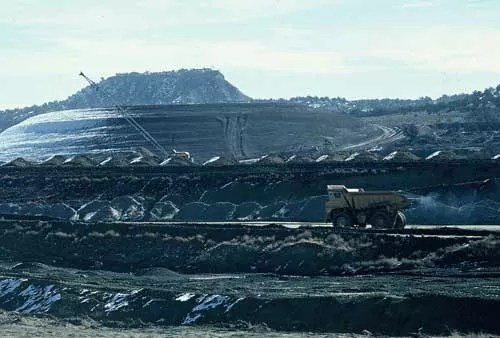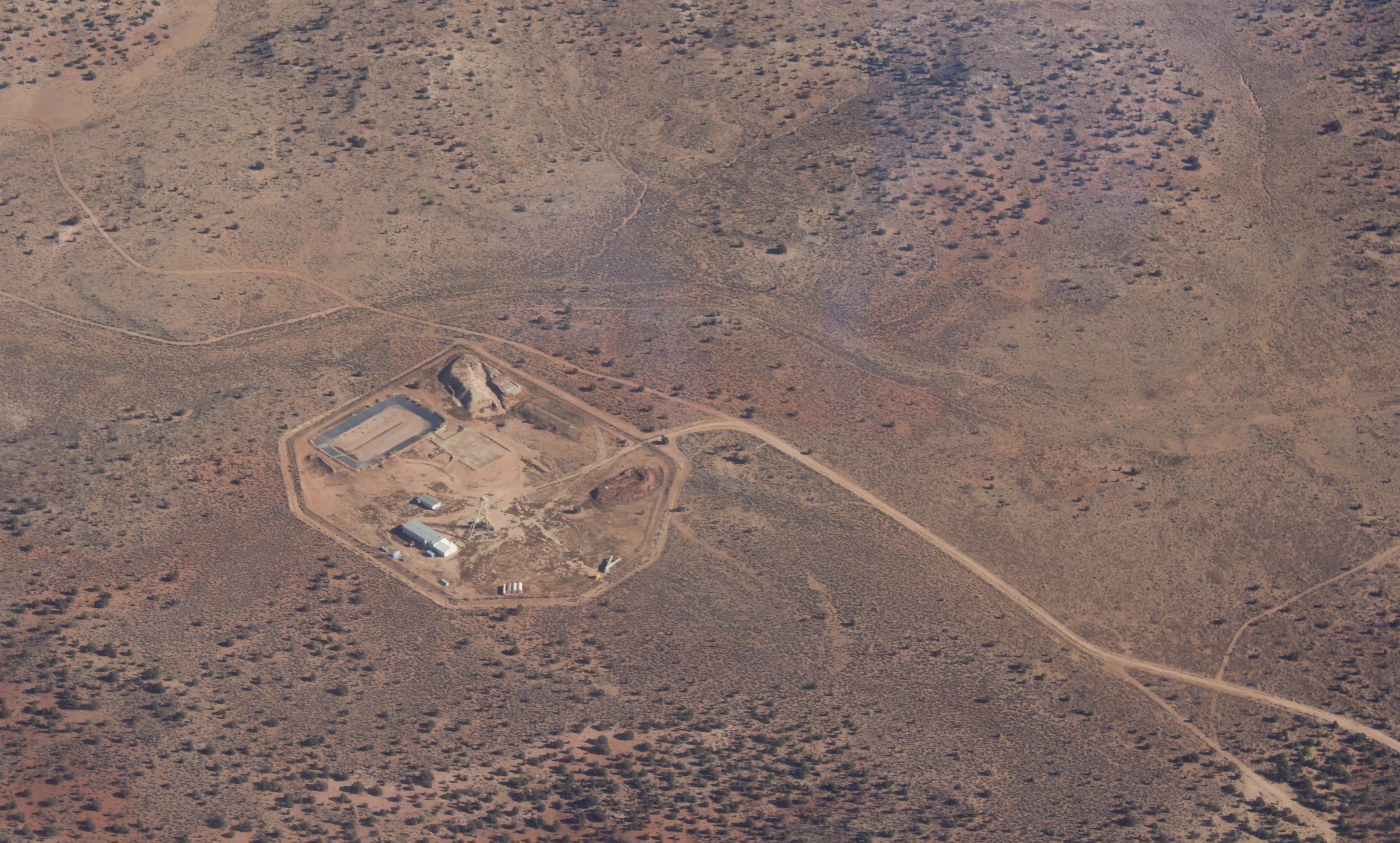
Elizabeth Whitman

Audio By Carbonatix
When Jamescita Peshlakai was a little girl, she herded sheep along the Little Colorado River, which courses through the Navajo Nation in northern Arizona.
One July morning in 1979, a dam containing tailings from United Nuclear Corporation’s uranium mill some 200 miles away broke, letting loose more than 1,000 tons of waste. Ninety-four million gallons of radioactive water gushed into the Puerco River, which feeds the Little Colorado.
More than 40 years later, the Church Rock spill is still the biggest release of radioactive material in American history.
The lambs born soon after that disaster barely lasted after birth, recalled Peshlakai, now an Arizona state senator.
“Once the umbilical cord was cut, they simply died,” she said. “That happened to a lot of livestock at that time, and we did not know it was because of the Church Rock spill.”

A historic photo of the Church Rock uranium mill in New Mexico.
Uranium mining has left a toxic, indelible imprint on the Navajo Nation. Mining companies would come in over the years to hire Navajo people for the backbreaking work of picking at uranium ore and hauling it in wheelbarrows.
When the companies were ready to move on, they abandoned more than 500 mines on the Navajo Nation, the water they had contaminated, and the people who worked them, many of whom died of cancer and whose offspring were born with birth defects, Peshlakai said.
“They never did anything to fix the land, and fix the communities or the tribal nations that they used,” Peshlakai said.
That legacy has done nothing to stop America’s dwindling uranium mining industry from going to the federal government and asking to be bailed out in the midst of a public health crisis.
At the end of March, two uranium companies penned a letter to President Donald Trump asking for a $150 million bailout, citing the economic impacts of COVID-19. One of them was Energy Fuels Resources, which hopes to open a uranium mine south of the Grand Canyon and whose exploratory operations already have led to it trucking radioactive water across the Navajo Nation.
The request quickly sparked disgust and fury among those who oppose the industry’s deleterious effects on people and the land.
Last Friday, a cohort of 75 conservation and grassroots groups penned a missive of their own and sent it to four congressional leaders, asking them to reject any bailout for an industry that has wreaked so much destruction, and calling into question the companies’ claims that a public health crisis like COVID-19 justifies extending a lifeline to a declining industry.
Leaders of the Navajo Nation also oppose the request.
Jared Touchin, a spokesperson for Navajo Nation President Jonathan Nez and Vice President Myron Lizer, said that the two leaders “would not support this effort if it proposes to use uranium resources that impact the Navajo people.”
Peshlakai also rejected the idea that the industry, which has never been held accountable for its operations in Arizona, receive a bailout.
“This industry should not be left off the hook,” she said.

Arizona State Senator Jamescita Peshlakai.
Arizona Legislature
In their letter to Senate Majority Leader Mitch McConnell, Senate Minority Leader Chuck Schumer, Speaker of the House of Representatives Nancy Pelosi, and House Minority Leader Kevin McCarthy, the 75 groups declared that the uranium industry was “falsely” suggesting that the COVID-19 pandemic had led to uranium shortages that threatened supply chains.
Rather than helping the industry, they said, Congress should “invest stimulus funds towards the assessment, reclamation, and cleanup of the hundreds of thousands of abandoned hardrock mines on public and tribal lands, which are currently polluting roughly 40 percent of western headwaters.”
Among the signatories were the Sierra Club, the Wilderness Society, the Grand Canyon Trust, and the Natural Resources Defense Council.
In the March 27 letter to Trump, Energy Fuels Resources, which owns Canyon Mine near the Grand Canyon, and Ur-Energy USA, asked his administration to act on recommendations predating the COVID-19 crisis to establish a strategic reserve of uranium and to “purchase strategic stockpiles of critical minerals” under the Defense Production Act, which Trump invoked in March, to “save the faltering domestic capacity.”
Although the letter admitted that “as uranium miners … we have been struggling to manage [supply chain and market disruptions] for several years,” it blamed COVID-19 and its economic fallout for pushing the industry to “the cusp of complete collapse.”
They warned that without these supports, the U.S. would be reliant on foreign producers, namely Russia and Kazakhstan.
“The COVID-19 crisis will pass but without immediate support from the federal government we could emerge from it and learn that a critical domestic capacity was permanently lost,” they concluded. If the administration could invest $150 million this year – out of $1.5 billion over 10 years that Trump proposed in February – in uranium mining, that would “serve as the first step in restarting domestic capacity to fulfill civilian and national security demands.”
The letter seemed aimed at goosing Trump into acting on a July 2019 memo that declared uranium imports a threat to national security. “We simply ask that you immediately implement the … recommendation outlined in your FY 2021 budget to establish a strategic reserve of uranium,” they wrote.
Asked how the COVID-19 pandemic had specifically hurt Energy Fuels Resources, spokesperson Curtis Moore said that the company’s Nichols Ranch facility in Wyoming had closed, which means that “there is now no uranium production in North America.”
“The U.S. uranium mining industry was already declining before the virus, and today’s crisis has compounded that challenge of trying to bring it back,” Moore said. “Without action, Russia and China will almost completely dominate the U.S. nuclear industry.”

The Canyon Uranium Mine, south of the Grand Canyon, in 2013. It is owned by Energy Fuels Resources.
To the 75 groups who wrote in protest, because the U.S. uranium industry has been in decline for years, the two companies are unjustly invoking the COVID-19 pandemic in an effort to make funding that the administration promised months ago finally materialize.
The industry is “seeking to take advantage of the global Coronavirus pandemic for their own benefit by seeking $150 million for the establishment of a uranium reserve,” they wrote.
Citing the fact that Arizona Public Service, which operates the country’s largest nuclear power plant, Palo Verde, recently said it was “confident” it could provide reliable service throughout the pandemic, they suggested that the industry’s warning of supply chain disruptions was misleading.
“Industry reports are telling us that they have more than enough uranium,” said Ray Rasker, executive director of the Montana-based Headwaters Economics, a nonprofit land management research firm. The U.S. already has a stockpile of uranium, he explained.
Because of a global oversupply or uranium, prices have also fallen low, Rasker said; right now, prices are below $30 a pound. And if they were to rise again, the most economically viable deposits of uranium in North America are in Saskatchewan, Canada – an ally of the U.S.
“There’s no national security concern,” Rasker said.
Past statements suggest that the industry is now invoking COVID-19 to seek what it believes it is due.
In a news release in February, Ur-Energy CEO Jeff Klenda said that the $1.5 billion, 10-year budget item was “a solid signal of support from the Administration.” That release noted that because of a “persistently weak uranium market,” the company had taken “multiple, aggressive measures over the years to control costs.”
The company’s corporate headquarters are in Littleton, Colorado, and it has a uranium facility, Lost Creek, in Wyoming. It describes itself as “engaged in uranium mining, recovery, and processing activities, including the acquisition, exploration, development, and operation of uranium mineral properties in the United States.”
Ur-Energy did not respond to a request for comment.

An aerial view of the Arizona One mine on the north rim of the Grand Canyon.
Antonia Noori Farzan
Mike Quigley, the Arizona state director for The Wilderness Society, a land conservation advocacy group, said that if the industry was asking for a bailout tied to COVID-19, then the burden of proof lay with those companies.
“If they’ve suffered direct damage from COVID-19, they should be demonstrating that to the public, whose funds they’re asking for,” he said.
Nuclear power plants in the U.S. generate about 20 percent of the country’s electricity, essentially carbon-free. The vast majority of the fuel they use – uranium – is imported from Canada, Australia, Russia, and Kazakhstan. Overall, the total U.S. production of uranium concentration has steadily declined in the last four years, figures from the U.S. Energy Information Administration show.
In an investigation in 2018, Phoenix New Times found that reviving uranium mining in the U.S. made little sense, because of the low quality of deposits in the country, an oversaturated global market, and the lack of benefits for local economies.